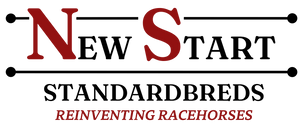Equine Standards Of Care
Here at New Start, we are dedicated to the welfare and well-being of our Standardbreds. Whether a companion, working partner, or athlete, each horse deserves a life filled with compassion, respect, and attentive care. The following minimum standards of care for horses in Canada align with our mission, our philosophy, and what we expect from each of our foster and adoptive homes as well.
1. NUTRITION AND WATER
Access to Clean Water: Horses must have access to clean, fresh water at all times. Proper hydration is vital for their health, and in colder months, water should be kept ice-free and at a temperature they find drinkable.
Balanced Diet: Horses require a diet based on high-quality forage such as hay or grass, supplemented with grain, vitamins, or minerals as needed to meet their individual health and nutritional needs. Specialized diets may be necessary for young, elderly, or special-needs horses.
Proper Feeding Practices: Feed should be provided in a way that prevents contamination or spoilage. Horses should be fed multiple times per day, according to their specific needs, and feeding schedules should be consistent.
2. SHELTER AND PROTECTION FROM ELEMENTS
Adequate Shelter: Horses should have access to shelter that protects them from extreme weather conditions, including wind, rain, snow, and sun. Shelters can be natural (such as trees or natural landforms) or man-made (such as barns, sheds, or windbreaks).
Bedding and Ventilation: If kept indoors, horses should have access to dry bedding to keep them comfortable and warm, as well as proper ventilation to ensure clean, fresh air and minimize respiratory issues.
Blanketing: Horses may need blankets in winter months if they are not acclimated to colder weather or if they have difficulty maintaining body heat. However, blankets must fit properly, be checked regularly, and be kept clean and dry.
3. HEALTH & VETERINARY CARE
Routine Veterinary Care: Horses require regular veterinary care, including annual health check-ups, vaccinations, and dental care. Routine dental maintenance is critical to prevent painful oral issues that can impact eating and overall health.
Parasite Control: Regular parasite control is essential to maintain a horse’s health. Deworming schedules and strategies should be developed in consultation with a veterinarian.
Hoof Care: Regular hoof trimming or shoeing by a qualified farrier is essential to prevent lameness and maintain mobility. Hooves should be checked regularly for injuries, infections, or abnormal growth.
4. EXERCISE & ENRICHMENT
Opportunity for Movement: Horses are naturally active and should have access to daily exercise, either through turnout in a pasture or paddock, riding, or other activity that allows them to stretch and move. This is essential for their physical and mental health.
Social Interaction: Horses are social animals and benefit from interaction with other horses. Providing companionship, whether in shared turnout or adjacent stalls, can reduce stress and improve overall welfare.
Mental Stimulation: Enrichment activities, like toys, varied environments, and safe spaces to explore, help prevent boredom and associated behaviors like cribbing or weaving.
5. HUMANE HANDLING & TREATMENT
Positive Handling Practices: Horses should always be handled calmly, confidently, and respectfully. Training should emphasize patience, kindness, and understanding of each horse’s unique temperament and needs.
Avoidance of Harmful Practices: Horses should never be subjected to harmful or abusive practices, including physical punishment or excessive restraint. Humane training methods ensure cooperation and trust between horses and handlers.
Safety Equipment: Horses should be handled and ridden with appropriate, well-maintained equipment, including properly fitted saddles, bridles, and halters. Safety for both the horse and handler should always be a priority.
6. RESPONSIBILITY & COMMITMENT
Lifetime Care: Owning or caring for a horse is a long-term commitment. Responsible horse care includes planning for the horse’s future needs, including retirement and end-of-life care when necessary. Know when to reach out to New Start if you need help!
Emergency Preparedness: Horse owners should be prepared to respond to emergencies, including injuries, sudden illness, or natural disasters. Emergency contacts, such as veterinarians and transport options, should be readily available.
Financial Responsibility: Proper horse care includes planning for all associated costs, including feed, shelter, veterinary care, and farrier services. Owners and caregivers should ensure they have the resources to provide high-quality care for the horse’s entire life. This includes reaching out to New Start if you are struggling or need assistance - we are here to help!
%20small.png)